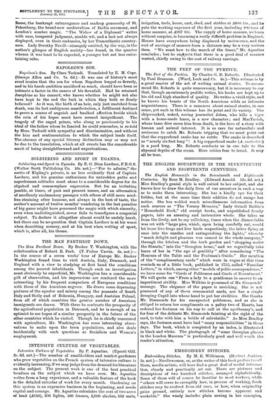THE ENGLISH HOUSEWIFE IN THE SEVENTEENTH AND EIGHTEENTH CENTURIES.
The English Housewife in the Seventeenth and Eighteenth Centuries. By Rose M. Bradley. (Edward Arnold. 12s. 6d. net.) Miss Bradley's genial style is well suited to her subject, and she knows how to draw the daily lives of our ancestors in such a way as to make them interesting. She has a kindly eye for their foibles, but at the same time their oddities do not escape her notice. She has welded much miscellaneous information from such sources as " The Verney Memoirs," Lady Grisell Baillie's " Household Book," old receipt books, and unpublished family papers, into an amusing and instructive whole. She takes us from the lively, not to say rollicking, times when the dinner-table was set with "large pies, which, upon being carefully cut, would let loose live frogs and live birds respectively, the latter flying at once into the candles and extinguishing the lights," whereby "much delight and pleasure was caused to the whole company," through the kitchen and the herb garden and "shopping under the Stuarts," into the " Georgian home," and we regretfully take leave of her in " the age of gentility " after considering " The Honours of the Table and the Footman's Guide." Her mention of the "complimentary cards" which were in vogue at this time reminds us of a little book, published in 1755, called "Familiar Letters," in which, among other "models of polite correspondence," we have some for "Cards of Politeness and Cards of Resentment.' We will quote one "From a lady to a gentleman in answer to an impertinent civility. Miss Wilkins is possessed of Mr. Simmonds' message. The elegance of the paper is ravishing. She is not possessed of any of these ornamental cards, nor has a single drooping Cupid into whose hand to put her civilities. She thanks Mr. Simmonds for his unexpected politeness, and as she is obliged to return her compliments on a paltry two of Hearts, has ordered her footman on his way to call at the apothecary's, and for fear of the delicate Mr. Simmonds fainting at the sight of the card, to take with him a bottle of salvolatile." As Miss Bradley says, the footmen must have had " many responsibilities " in those days. The book, which is completed by an index, is illustrated in black and white. The photograph of "some Georgian glasses in the London Museum" is particularly good and well worth the reader's attention.


























































 Previous page
Previous page